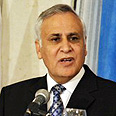
The list of witnesses against former President Moshe Katsav includes two senior media figures in the past and present – Ilana Dayan and Knesset Member Shelly Yacimovich. They will testify that the complainants against Katsav told them, years ago, about his sexual conduct towards them.
It turns out that for many years many journalists knew about Katsav’s alleged actions – yet they did not publish a thing. Why did they keep it to themselves? After all, their job is to publish any information they get, if there is public interest in it. Did they keep a secret among friends and close associates? Did they protect a source or a government leaker?
The answer to these questions is negative. We are talking about veteran journalists, capable and decent professionals, who fully understood the power of the story they had. They would not hide a story of such scope just because of hopes to get future leaks.
So why was this story kept from the public? Why did the media – which heard the complainants long before the police did – fail to publish the stories before the police launched an investigation against the president?
The answer to this is clear to anyone familiar with the journalistic world: The journalists knew about it, but could not publish the information they possessed because they had no chance of winning the libel suit Katsav would have filed against them.
Israel’s libel laws do not grant journalists any extra rights. Should a journalist be sued, he must present the court with solid evidence and prove he uttered the truth. However, Israeli law does recognize people with extra rights: A Knesset member or minister enjoys immunity. He or she can say whatever they wish in the framework of their job and they cannot be sued, even if what they say is slanderous or highly defamatory.
Meanwhile, police investigators, prosecutors, witnesses, and defense attorneys are protected against libel suits over words uttered in court. They are allowed to smear a suspect when the police have no evidence against him without being held accountable for the veracity of their claims.
The American solution
In the democratic regime in place in Israel, there is significance to letting the media investigate and publish important information about elected officials. In the United States, a legal solution that allows for such probes was found. A public official who sues a journalist must prove that the publication was undertaken maliciously and that the journalist knew, at the time of publication, that the information was false and slanderous.
This rule was set in a series of verdicts by the US Supreme Court. The judges ruled that there is no journalistic freedom without this rule. Had it existed in the confines of Israeli law as well, the disturbing information about Katsav may have been published many years ago when journalists found out about it.
It is possible that Katsav would have never been chosen as Israel’s president, and we would have been spared the embarrassing indictment regarding acts allegedly carried out at the minister’s office and at the president’s office.
Is there a chance that in the new Knesset we will see a Knesset member who will propose a similar rule, which will allow for a little more journalistic censure of public officials?















